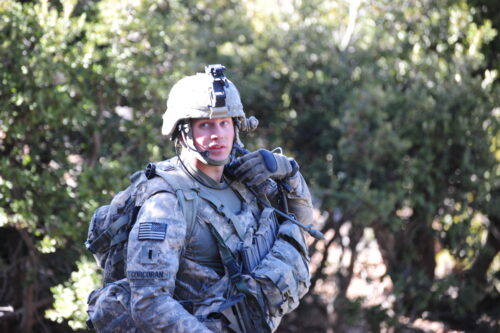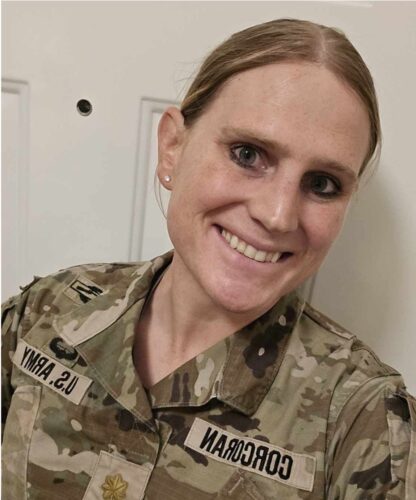Read the other blog posts in our Service Beyond Gender series:
- U.S. Navy Lt. Rae Timberlake’s Mission of Authenticity and Dedication
- As He Prepares to Teach at West Point, Captain Gordon Herrero Reflects on His Leadership Journey
- Major Alivia Stehlik’s Mission of Care and Legacy of Compassion
- Clayton McCallister’s Pursuit of Purpose and Dream of Service
- The Fight to Serve and the Future of the Force
- Nathan Casey’s Journey of Music, Leadership, and Visibility in the Marine Corps
By guest contributor Trish King
Just hours after retaking office, President Donald Trump signed an executive order signaling his intent to again ban transgender individuals from serving in the U.S. military. A week later, on January 27, 2025, this intention became official with the signing of a second executive order that effectively reinstated a ban.
For service members like U.S. Army Major Kara Corcoran, the decision is a blow that undermines years of dedication and resilience.
“Transgender Americans have served openly and honorably in the military for nearly a decade, embodying unparalleled dedication and courage,” Major Corcoran says. “Thousands currently hold specialized roles that have required many years of training.”
Speaking proudly of her transgender siblings in arms, she adds, “What greater proof of their patriotism do you need than their continued willingness to defend American values — despite institutional biases and societal challenges to their freedom?”
For Corcoran, this statement also resonates on a deep personal level. As an infantry officer with over 17 years of experience, two combat deployments, and a career filled with recognition for leadership excellence, her journey exemplifies these values.
“Every day, I put on this uniform because I love my country,” Corcoran says. “This is about protecting the Constitution, not personal politics. Excluding qualified Americans from service weakens the very foundation of what makes this nation strong.”
A Career Rooted in Excellence
Corcoran’s journey as an infantry officer began at Norwich University, where she was commissioned through ROTC. Over her distinguished career, she has deployed twice to Afghanistan, led troops as a platoon leader and company commander, and earned the coveted Ranger Tab.
As an instructor at the Maneuver Captains Career Course and a battalion executive officer, she has shaped future Army leaders while embodying the Army’s values of honor, courage, and commitment.

Major Corcoran in her younger years
Her strength and passion for leadership extends beyond her official military role. In her off-duty time, she serves as Vice President of SPARTA, a nonprofit supporting transgender service members and a coalition partner of Modern Military.
In this volunteer role, Corcoran works tirelessly to support transgender service members navigating uncertain times. “SPARTA’s work is about ensuring that every transgender service member has a voice and the resources they need to thrive,” she says. “Our mission is to create a force where everyone is judged by their merit — not by misconceptions about their identity.”
The Cost of Exclusion
The effective reinstatement of this ban on transgender troops undermines military readiness by needlessly excluding capable Americans from service. With only 23% of young Americans eligible to serve due to health, education, or legal barriers, every qualified volunteer is essential to maintaining a strong, adaptable force.
Transgender service members, like Major Kara Corcoran, have consistently demonstrated excellence in leadership, innovation, and mission execution — proving that the strength of our military lies in valuing merit over bias.
SPARTA’s advocacy highlights the critical role of transgender service members in maintaining readiness and cohesion. “Their service proves that what defines a warrior is not identity, but merit, competence, character, and commitment,” says Corcoran. “By excluding them, we not only harm capable individuals but also weaken the trust, cohesion, and effectiveness that make our military the best in the world.”
Corcoran also highlighted the ripple effects of the ban on morale and unit cohesion. “Service members don’t care about gender identity — they care about who can get the job done,” she explains. “Policies like this undermine trust and cohesion, not just for transgender individuals, but for their teams who see their contributions firsthand.”

Resilience in the Face of Adversity
Despite these challenges, and as transgender service members wait to see how newly-filed lawsuits play out, Corcoran’s message to her peers is one of determination: “Put on your uniform. Do your job. Let your actions speak louder than those who seek to tear you down,” she urges. “We have a responsibility to show the world what we’re capable of, no matter the barriers placed in our way.”
This is not a battle that long-serving transgender troops wanted to fight again. Yet Corcoran remains focused on her mission, drawing strength from her career and the community she’s helped build through SPARTA. “I’ve seen what we can achieve when we stand together,” she says. “This fight is bigger than any one of us — it’s about ensuring the future of a military that values every qualified American willing to serve.”
A Call to Action
SPARTA continues to lead efforts to support transgender service members, advocating for fairness and inclusion in the face of political headwinds. Corcoran urges allies and advocates to amplify their voices by reminding policymakers and the public of the military’s commitment to meritocracy.
“The fight isn’t over,” Corcoran concludes. “We will always exist, always serve, and always fight for the country we love.”
For more information about SPARTA’s mission and how to support transgender service members, visit their website. Together, we can ensure that every qualified American has the opportunity to serve with dignity and pride.
About the author: Trish King is a retired U.S. Army infantry NCO and the first openly transgender service member in her field. She writes about military life, family, and LGBTQ+ rights, drawing from her decades of service and personal experience.
Know a veteran who’s struggling? Free help available here.
Sponsored by the SSG Fox Suicide Prevention Program
© Copyright modern military association | EIN 52-1845000 | all rights reserved | legal & Financial
